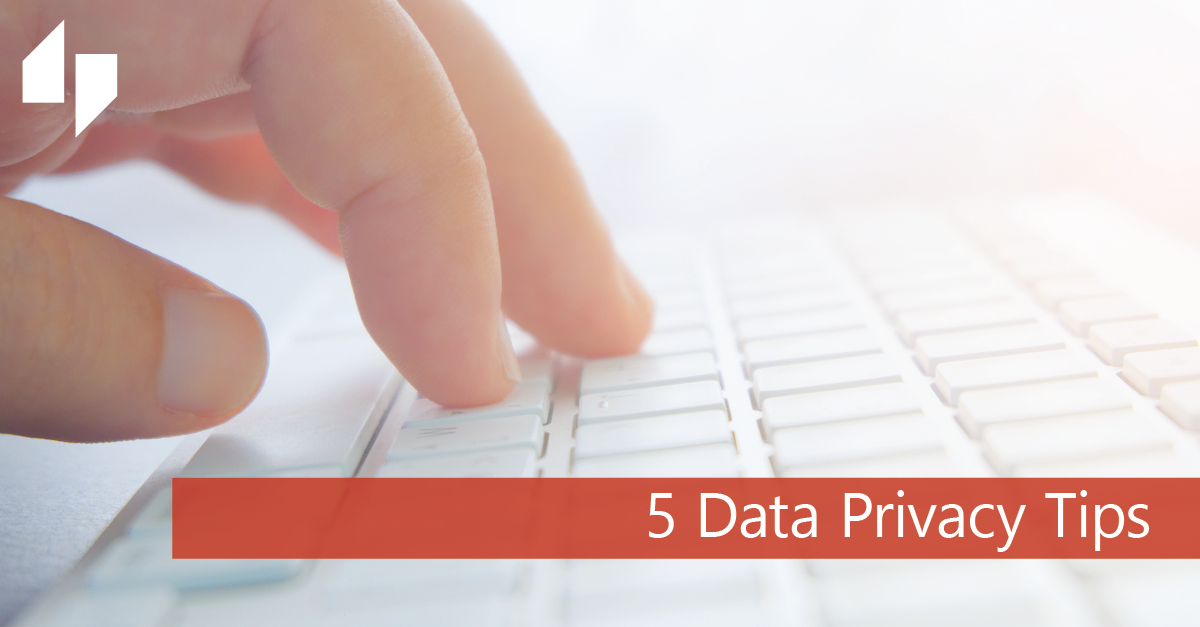5 Data Privacy Tips
Data Privacy Week is celebrated to raise awareness about the ways hackers make attempts to steal data online or otherwise. In order to help you keep your data safe, we have provided 5 important tips with easy changes you can make to protect your sensitive information.
Keep Your Account Logins Secure
Although it is easy to remember passwords that are simple or have certain personal information, it is recommended to create complex passwords and store them in password management software to protect your data. It’s also a good idea to update your passwords periodically.
Scammers are going beyond simply guessing your password based on information they find on you online. There have been several major data breaches in recent years that have affected major companies like Facebook, Target, Home Depot, Marriott, and more.
Two-step authentication is an added measure to keep your accounts secure. For one, it will require your secondary approval every time you try to access your accounts, and it will give you a notification if someone else is trying to access your accounts without your knowledge.
Protect Your Computer from Viruses
Personal computers can be vulnerable to attacks from malicious software. It is worth installing antivirus software as a layer of protection against intrusive Malwarebytes. Most commonly, these can come from clicking on suspicious links online or that you receive via email. If it doesn’t look right or gives you pause, it’s better to err on the side of caution.
Attempts to steal your information or give your computer viruses by using email are called “phishing”. Phishing emails can seem as real as any regular marketing email you receive. One way you can tell real emails apart from phishing emails is by looking at the sender’s address.
This example below claims to be from Instagram, but it was sent from a fake email address.

The email is asking you to change your password. When you click links in phishing emails, hackers can steal the information you put in and use it to obtain even more sensitive information.
Avoid Wire Fraud Scams
Specifically, in the mortgage industry, borrowers can be at risk of falling victim to wire fraud. There are times when borrowers may have to wire funds to a settlement agent when they are near closing day to finish their transaction. If this is the case, we will confirm it verbally.
As a rule of thumb, never wire transfer money to any person or entity involved in your mortgage transaction without calling our office and speaking with a member of our team to confirm. Even if an email looks like it has come from your lender, it may be an example of phishing fraud.
Know Which Websites are “Secure”
You may notice that some websites – like ours – have a padlock symbol next to the URL. This symbol means that the site is secured with a digital certificate ensuring that the website owners are who they say they are. It ensures that the connection to that website is encrypted so that any information you share is safe from being accessed by any third party.
If a website does not have a secure padlock symbol, it is not as guaranteed that your information will be safe. Exercise caution when it comes to inputting any financial or secure information on these sites.
Be Aware of When Your Information Becomes Public
After you close on a mortgage loan, some of the details of your transaction become public information. Other lenders – or even potential scammers – will gain access to this information and may try to contact you. For example, you may receive a letter from another lender that includes a line “Re: HomeLend Mortgage” in the address. If this is a legitimate business attempt, there should also be a disclosure that says that they are not affiliated with HomeLend Mortgage. If not, there is even more cause for concern.
Once your loan is transferred to your new servicer, we will not be sending you any more mail. You may receive emails from your Mortgage Banker to follow up for future business, or from news@homelend.net to request a review or share relevant mortgage information.
Summary
As Data Privacy Week ends, remember that preserving the integrity of your sensitive information online is a continuous effort. These are helpful tips to be aware of, but it is just as important to stay up to date on trends related to data privacy and cybersecurity so you can stay ahead of any malicious attempts on your data.




